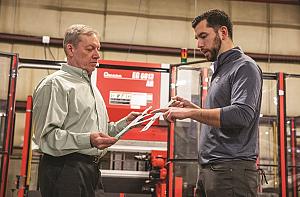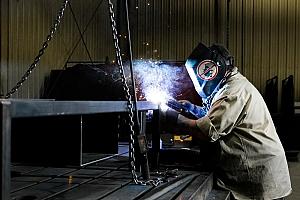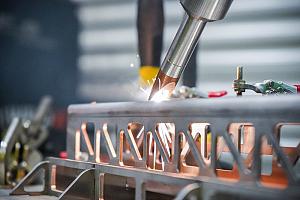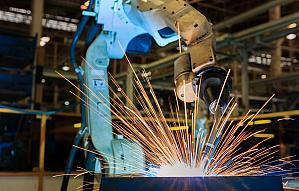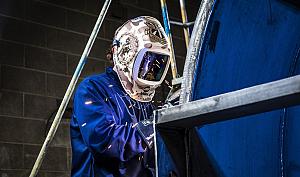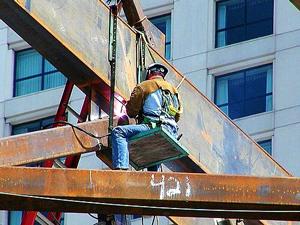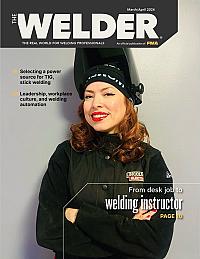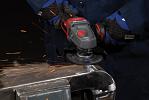Contributing Writer
- FMA
- The Fabricator
- FABTECH
- Canadian Metalworking
Categories
- Additive Manufacturing
- Aluminum Welding
- Arc Welding
- Assembly and Joining
- Automation and Robotics
- Bending and Forming
- Consumables
- Cutting and Weld Prep
- Electric Vehicles
- En Español
- Finishing
- Hydroforming
- Laser Cutting
- Laser Welding
- Machining
- Manufacturing Software
- Materials Handling
- Metals/Materials
- Oxyfuel Cutting
- Plasma Cutting
- Power Tools
- Punching and Other Holemaking
- Roll Forming
- Safety
- Sawing
- Shearing
- Shop Management
- Testing and Measuring
- Tube and Pipe Fabrication
- Tube and Pipe Production
- Waterjet Cutting
Industry Directory
Webcasts
Podcasts
FAB 40
Advertise
Subscribe
Account Login
Search
Newbie mistakes made, experience gained
- By Marty Rice
- September 29, 2009
- Article
- Arc Welding
We all make mistakes. What's important is that we learn from them. However, some mistakes on a welding job can be disastrous and should be prevented at all costs. I speak from experience.
I had been a maintenance and fabrication welder at a shop and black iron plant for a few years, but I was a rookie in the Ironworkers union when I was sent out to a powerhouse. I was on a welding gang, and we were going through a lot of rod, constantly needing more, and I was elected to go get it. We welded every connection on that sucker, because a tornado had hit another powerhouse and literally twisted columns, popping inch-thick bolts like buttons on a cheap shirt.
A lot of the connections were really hard to get to and scary as hell to work on. We had baskets made out of round bar that weighed a good 60 or 70 lbs. that we'd hang on the outside of the building so we could climb down in to weld the hard-to-reach connections. Many times we had to push them quite a ways across this spooky 4-in. beam to the connection we were working on. It's scary enough walking a 4-in. beam 20 floors up wearing 35 lbs. of tools on your belt. Throw in a danged awkward basket to slide in front of you and the fear factor is big-time!
One day I looked over and saw a news crew on the unit next to us. That unit had been completed, and the crew was doing a story on the second unit we were building. I had to walk on the outside perimeter beam about 25 floors up with the wind blowing like crazy while carrying 50 ft. of welding lead on my shoulder. It was already a scary walk, but the wind blowing and me being off-balance with the lead on my shoulder made it worse. As I walked I put a determined, tough look on my face. That was my outward appearance. Inside was a shrill, little-girl voice begging God not to let me fall.
We would put the rod cans as close as we could to the work and then load the rod pouches on our tool belts, which allowed us to cross that scary abyss as few times as possible. Usually beams are on the floors underneath you, so you at least have a false sense of security that you might grab onto one if you fall. (I actually did one time on another job.)
There were grated walkways up to where we were working. It was a long way there and back, so I decided to carry two boxes instead of one. Fifty lbs. on each shoulder was heavy, but I wanted to show I was a hard worker. Grating is supposed to be bolted down, but some aholio left a section unbolted and it was overlapping about an inch high, kinda like a jigsaw puzzle piece not quite in its slot.
I was walking along when the toe of my nice new Redwing boot caught the grating and I went for a tumble. There was a 20-some-odd floor drop on both sides of the walkway, and I couldn't take a chance of dropping one of the boxes on the people working below. So instead of putting my hands out like you would in a "regular" fall, I basically used my knees and face to cushion the blow.
Do you think my brother ironworkers laughed when they saw my scratched-up face and bloody, torn jeans? Do you think I ever tried to be a he-man and carry two boxes again? Newbie mistake made, experienced gained.
Important Dos and Don'ts
Here are some Do's and Don'ts you might want to consider to help minimize mistakes, particularly if you are a newbie.
Build on Your Foundation—Don't think you're a welder just because you've passed a certification test. That cozy little welding booth is a lot different than the shop or field. Howling wind; twisting like a contortionist; a foreman hollering you ain't fast enough; lousy fit-up; and dangerous, dirty, crazy conditions make a shop or field a little bit different than that booth.
That doesn't mean you can't go out and make a good hand; it just means you've got a lot to learn and a lot of burning to do before you really are a good welder. Don't get me wrong, it's outstanding that you've learned to pass the test. That's your foundation, and the foundation is as important as anything in your career as a welder. Now it's time to start building on it.
Show up on Time—Don't wait to find out where the job is on your first day. Drive over, see what it looks like, check the parking, and figure out how long it'll take to get there beforehand, if you can. Allow for traffic and weather and get there 15 minutes early! Be on time and show up every day. That's the reputation you want to earn, an "everyday" hand. That means if you have a little cold or the sniffles, or your little tummy hurts, you get your ass out of that bed and go to work anyway.
Project Confidence, Not Cockiness—Do act confident when you walk onto the job for the first time. The longer you work on a job in a shop or factory, or the more jobs you work in the field, the more confident you will be. The more you read, watch videos, research manuals, and search the Internet, the more confident you'll become. When I started I had nothing but technical manuals that pretty much made my head want to explode. Now you have all kinds of media to check out.
Don't let your confidence turn into cockiness, and don't ever do something you aren't qualified to do.
Listen—Do keep your pie hole closed. If older, experienced hands are talking, keep your mouth shut and listen. Do not interject any of your lame-brain, nonexperienced foolishness into the conversation. If you think I sound gruff or rude here, then don't listen to me and see just how gruff and rude an old hand can be. Listen and learn, grasshopper; you'll have your own stories to tell someday.
Don't listen to the negative goof-offs, and don't let them influence you. They're the punks who want to sit around whining, complaining, and running down everything they can. They'll do anything to get out of work, or do a half-assed job, and as the saying goes, misery loves company. Instead, pick someone with character and a good work ethic to emulate and ask advice from.
Tough It Out—Don't get discouraged because there is so much to learn. Just keep on learning, and when it gets rough, tough it out. Most of the time, it'll be worth it, because things get better.
Leave on Good Terms—Don't burn your bridges when you quit; you may need to work there again someday.
Be Safe at All Times—Don't be unsafe! Never. A lot of bosses will take advantage of a newbie, because they know you don't know any better. That's why it's important to learn all you can about safety before you ever set foot in the shop or field. Those safety lessons may sound boring in class, but they might save you from getting maimed or killed, or worse in my book, maiming or killing someone else. I had two bad accidents in the field that put me in the hospital. Both were caused by the other guy not following safety procedures.
Save for a Rainy Day—Don't blow money. I wish someone had told me that when I first started. I invested in Coors, Pabst, and Bud, along with a few taverns and I'm not talking stock options. If you're in the field and you get rained out, you don't get paid, hence you better adhere to the old saying "save for a rainy day!" My apprentice teacher, Jim Fenwick, God rest his soul, taught me to save 10 percent of every paycheck, and that advice came in handy more than once.
Do pay yourself first by maxing out your 401(k) and getting IRAs for yourself and your spouse if both of you work.
Don't get in debt. It‘s just stuff. Being in debt sucks and makes you a slave to "The Man." No debt equals freedom. Freedom rocks!
You're gonna make some mistakes. It's been 30 years since I was a newbie, and I still make 'em. But, and this is a big but, you can strive to make as few as possible. And in our trade that just might mean saving yourself or someone else from getting hurt or killed.
About the Author

Marty Rice
High School Career Center in Texas
Questions for the author can be e-mailed to vickib@thefabricator.com
About the Publication
subscribe now
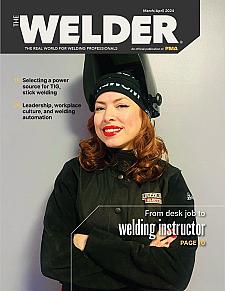
The Welder, formerly known as Practical Welding Today, is a showcase of the real people who make the products we use and work with every day. This magazine has served the welding community in North America well for more than 20 years.
start your free subscription- Stay connected from anywhere

Easily access valuable industry resources now with full access to the digital edition of The Fabricator.

Easily access valuable industry resources now with full access to the digital edition of The Welder.

Easily access valuable industry resources now with full access to the digital edition of The Tube and Pipe Journal.
- Podcasting
- Podcast:
- The Fabricator Podcast
- Published:
- 05/07/2024
- Running Time:
- 67:38
Patrick Brunken, VP of Addison Machine Engineering, joins The Fabricator Podcast to talk about the tube and pipe...
- Industry Events
World-Class Roll Forming Workshop
- June 5 - 6, 2024
- Louisville, KY
Advanced Laser Application Workshop
- June 25 - 27, 2024
- Novi, MI
Precision Press Brake Certificate Course
- July 31 - August 1, 2024
- Elgin,

